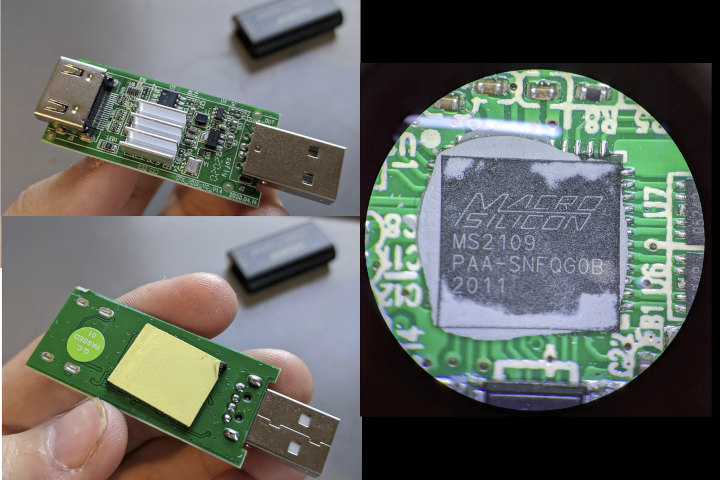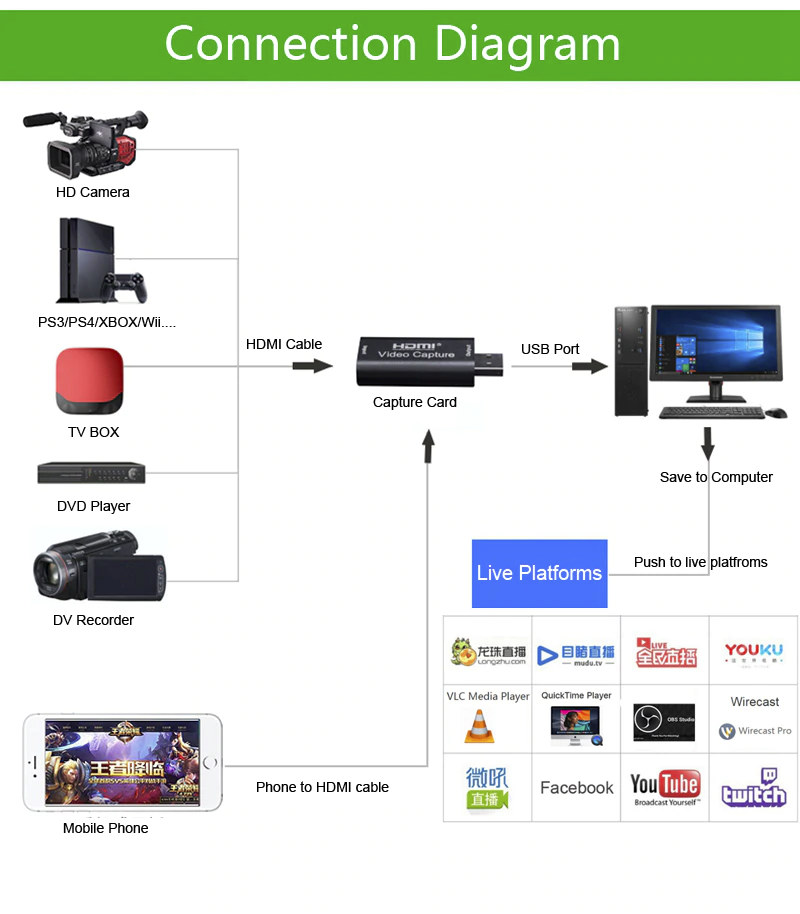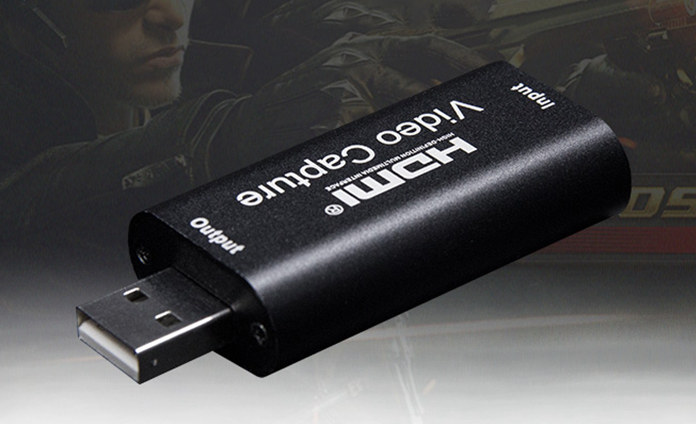Over the years we’ve covered several HDMI input solutions for PiP, video capture, and/or RTSP streaming and some of the most popular options where Realtek RTD1295 based TV boxes such as Zidoo X9S or LAKE I Home Cloud.
But there’s now a more cost-effective option with “Camlink” HDMI to USB 2.0 converter which you can connect to your PC or single board computer. It’s compatible with UVC video class, supports up to 1080p30, and offers HDCP compatibility. Best of all it’s really cheap with pricing starting at around $11 on Aliexpress including free shipping and also available on eBay.
Key features and specifications:
- HDMI input up to 4K resolution (3840×2160 @ 30 Hz) with 8/10/12 bit color depth support; Up to 15-meter cable (AWG26)
- Video Output up to 1080p30 using YUV or JPEG modes
- Audio – L-PCM
- Compatible with common video software such as VLC, OBS, Amcap, etc …
- Compliant with USB UVC video and UAC audio classes
- Works on Windows, Android and Mac OS (and probably Linux too)
- Power Supply – 5V/0.4A via USB port from host computer or board
- Dimensions – 64x28x13 mm
- Weight – 21.4g
It’s an easy way to add an HDMI input to your laptop, and gamers who like to stream themselves while gaming will certainly find it useful. Note that if you plan to connect the device to an Android smartphone the USB port must support OTG.
I found out it via Arsenio Dev on Twitter, who posted internal photos and other interesting details.

The USB dongle is based on MacroSilicon MS2109 ASIC that’s not yet listed on the company website. An analysis of the UVC data shows supported video capture resolutions range from 720×576 to 1920×1080, and metadata from captured video reveals the dongle will auto-synchronize to the video refresh rate. He also reported a 20ms delay representing a great improvement over the hundred of milliseconds he got with Elgato HD capture card.


Jean-Luc started CNX Software in 2010 as a part-time endeavor, before quitting his job as a software engineering manager, and starting to write daily news, and reviews full time later in 2011.
Support CNX Software! Donate via cryptocurrencies, become a Patron on Patreon, or purchase goods on Amazon or Aliexpress






This comment summarizes the problems: “I think their only real downside is the MJPG compression and chroma subsampling to fit the stream on USB 2.0. No worse than a webcam but can affect text readability for desktop capture, especially with subpixel anti-aliasing in the source material. So cheap though!” You should get a lot better performance out of a USB 3.0 model since it doesn’t have to compress to fit inside 480Mb/s. He mentions having a USB 3.0 stick on order. Alternatively they could implement h.264/5 in their chip. This is a waste for sampling 4K. It sure is’t going… Read more »
After reading this article this morning, i was on Amazon uk this afternoon and several usb3 hdmi capture devices adverts popped up for below £15 @ 1080p 60fps.
For long time I have been thinking to buy a similar gadget. At such a super low-cost price point it is no-brainer. I don’t expect much out of it. If it just works (even with bad quality) I will be happy 🙂
i’ve read that those ‘usb3’ ones are the same thingies just with blue port with usb3 pins unconnected and higher price tag 🙂 anyway, got mine usb2 one today and it works nicely for the price
Yup. In my case plastic housing with USB tail, works nicer with laptops with vertical USB ports. However, the metal housing of the “USB2.0” device seemed thermally more appropriate and can be opened by unscrewing nicely, making it easy to verify that the MS2109 has a heat sink. Also it is more compact. So my advice would be to stick with the “USB2.0” version. At least at the time of my buying, it was really well-made.
I bought such a thing recently. Only CNY ¥45.
It works with generic UVC and USB audio drivers on Linux, although to get them mixed together I need OBS. (When I do not want audio, any program that expects a USB webcam works)
A major problem is that when doing 20fps+, it must be MJPG compressed, this affects graphics quality.
Whilst this is a USB 2.0 solution, I guess a USB 3.0 one would be far more useful and for not much more. But in terms of adding HDMI input to a laptop (or even a tablet) it seems that one potential use is not just for capture but to use a laptop/tablet screen as a gaming screen. If this particular one has only a 20ms lag, perhaps a USB 3.0 model might yield lag to enable near real time response. It’s a function that none of the Youtubers seems to have really tested as a low… Read more »
How do I make it work on macOS? I had macOS 10.13.6 (which may not be supported). QuickTime Player I thought might work with new video recording… but the device is not recongized (like iPhone/iPad is not in this macOS version, later versions recognize those devices.)